Bob Hawke: The rambunctious rogue who led Australia
- Published
Five key moments from Bob Hawke's life
In an era of Australian leadership turmoil, the death of Bob Hawke, a beloved former prime minister, feels especially poignant ahead of a national election on Saturday, writes the BBC's Hywel Griffith in Sydney.
Australia loves a larrikin - a rambunctious rogue who does not care about convention. In Bob Hawke, who died on Thursday at 89, the country found a natural leader, happy to play the role.
Though he swore off alcohol while in office, well into his late 80s, he would still perform his famous party-trick of downing a glass of beer at cricket matches, always to rapturous applause.
But Hawke's antics belied a sharp political mind that understood the need to build consensus and keep the voters on his side.
"These acts of drinking, these acts of womanising, as much as they got out into the public eye were a calculated risk on his part," says associate Prof Anika Gauja from the University of Sydney.
"It was cultivated on his part to perpetuate his image of an easy-going guy. I'm not sure whether in today's style of politics, whether he'd be seen as too much of a liability in the social media age."
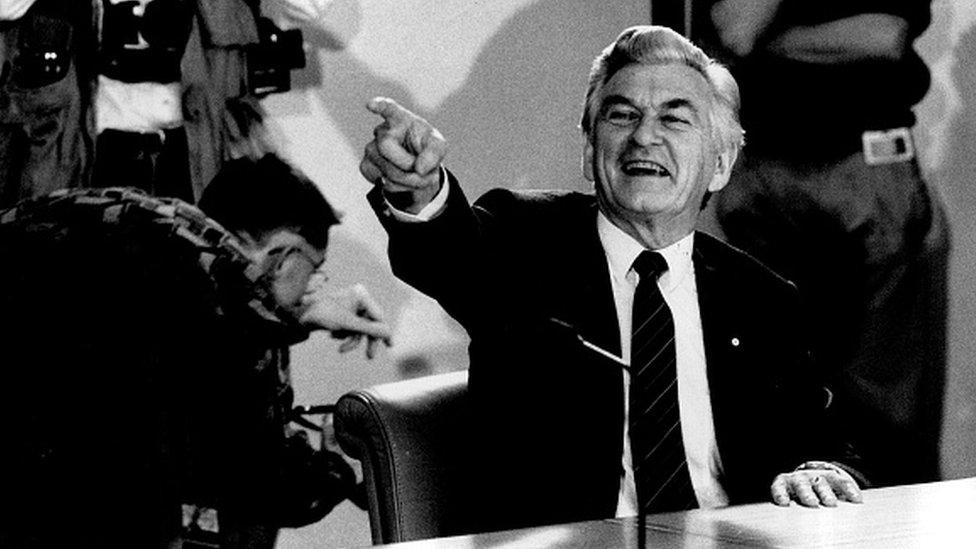
Hawke was a leading trade unionist before entering Australian politics
Hawke's eight years as Australian prime minister - still a record for a Labor leader - stands in conspicuous contrast to the most recent decade of turmoil in Australian politics.
No prime minister has served a full three-year term since another long-serving leader, conservative John Howard, left office in 2007.
For many Australians, both men - though ideological opposites - recall a kind of carefree stability that is lacking in today's politics.
And Hawke still holds the highest approval rating of any serving Australian prime minister.

Australian election 2019

Despite poor health, he had been active in public consciousness in recent days - releasing spirited statements to promote Labor's cause. Inevitably, his death will loom large in the remaining hours of Australia's election campaign.
Prime Minister Scott Morrison saluted him for having "a unique ability to speak to all Australians" and said he would be "greatly missed".
Labor leader Bill Shorten - who, like Hawke, forged his career in trade unions - paid tribute to a man he called "Australia's favourite son".
Charisma and ambition
Hawke was born in 1929 to a family with strong connections to the Labor movement. By the age of 15 he had told friends he would one day be prime minister.
After studying in Perth, Oxford and Canberra, he entered a career in the trade unions, where he honed his famous negotiating skills.
In 1974, they were called upon to help convince Frank Sinatra to retract sexist comments he had made on tour in Australia, after the singer called female journalists "buck-and-a-half" prostitutes.
Sinatra had initially refused to apologise, prompting fury and reports that airport workers would refuse to refuel his plane. It ended in a bizarre standoff at a Sydney hotel.
Over cognac and cigars there, Hawke persuaded Sinatra to issue a statement of regret, ending a nationwide boycott of Sinatra's shows.

Bob Hawke arriving at the Boulevard Hotel in Sydney to see Frank Sinatra in 1974
Hawke had become a public figure long before he entered parliament at the age of 50, and within three years he rose to become Labor leader and prime minster.
His first, landslide election victory in 1983 gave him a mandate to push through contentious changes, with an agenda of privatisation and deregulation at odds with his party's traditions.
But some of his reforms were clearly too ambitious.
As he set his sights on a third election victory in 1987 he pledged that "by 1990, no Australian child will be living in poverty".
He would come to regret that defining moment, especially as the written version of his speech said only no child "need live in poverty."
It was a rare slip of the tongue for a politician who seemed so comfortable and relaxed on the big stage.
Internationally, he helped renew Australia's floundering friendship with the United States by committing troops to the Gulf War.
But Bob Hawke was also aware of the need to seek allies closer to home.
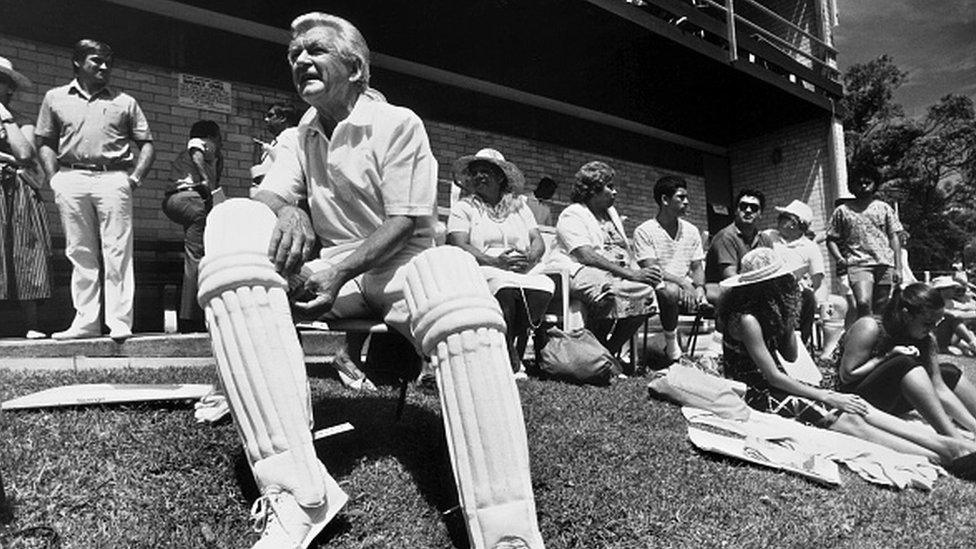
The prime minister nearly lost sight in one eye during an accident at a cricket game
"His image could be quite perplexing to foreigners, but I think Bob Hawke will be remembered as the Australian prime minister who really started engaging with Asia," says Associate Professor Anika Gauja.
"His move to internationalise Australia's economy will be remembered very positively."
Inevitably his popularity dimmed at home when Australia's economic fortunes worsened, and after eight years in office, in 1991, he was replaced by his long-time Labor colleague and rival Paul Keating.
There was little love lost between the two men, although Bob Hawke did later claim he was grateful to Keating for ousting him from office, as it meant he had the opportunity to re-marry.
In 1995 he divorced his first wife Hazel in order to marry his biographer Blanche d'Alpuget, with whom he had had a long-running extra-marital affair.
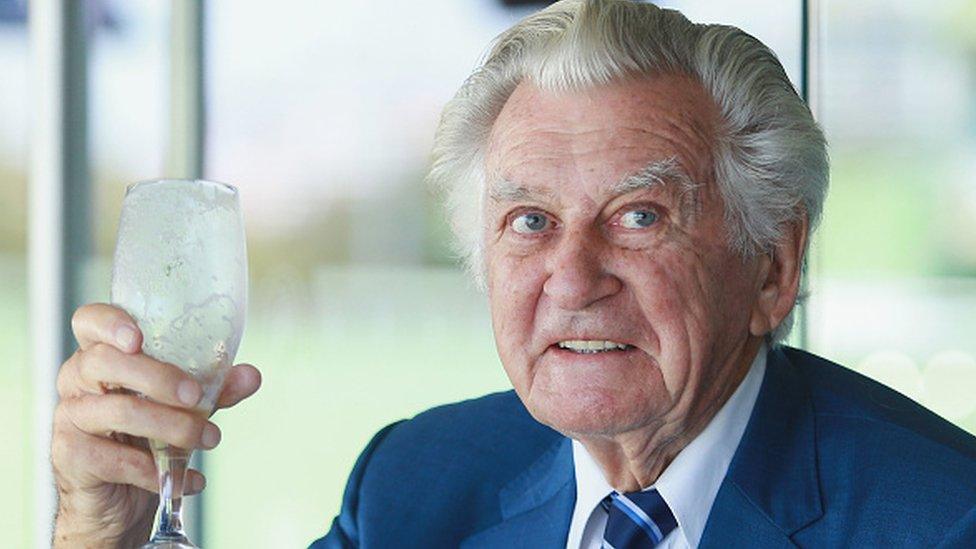
Hawke will be remembered by Australians as the prime minister who made serious politics look like fun
Despite losing power, Hawke regularly appeared in public alongside Blanche, his reputation restored and his place in history assured.
Among legacies still felt today, Hawke's government launched Medicare - Australia's universal healthcare system - and outlawed sexual discrimination in the workplace.
It also restricted uranium mining on indigenous lands, and prevented the damming of Tasmania's world heritage-listed Franklin River. Hawke also led international efforts to protect Antarctica from mining, after refusing to ratify a proposal put to Antarctic Treaty nations.
"I just couldn't believe it. Here was the last pristine continent," Hawke recalled to the Sydney Morning Herald in 2016. "We were going to be called upon to ratify it and I thought: 'no bloody way'."
His death is perhaps felt even more acutely at a time when Australians are preparing to head to the ballot box on Saturday.
As one former Hawke staffer and now ABC presenter, Barrie Cassidy, noted soon after his former boss's death: "What a sense of timing."
For most Australians, he will always be remembered as the prime minister who loved a drink and joke, and made the serious work of politics look like fun.
- Published16 May 2019
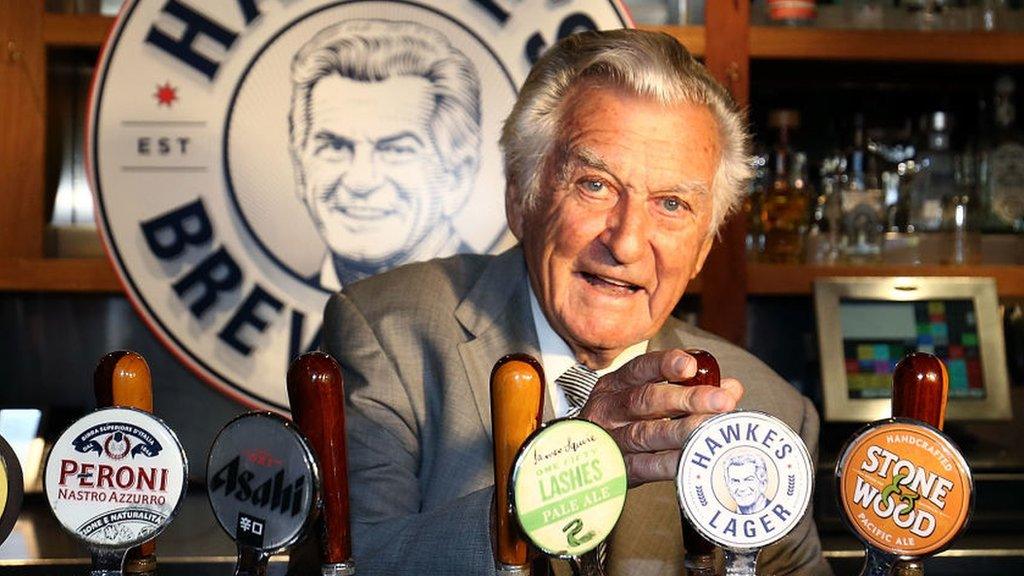
- Published16 May 2019
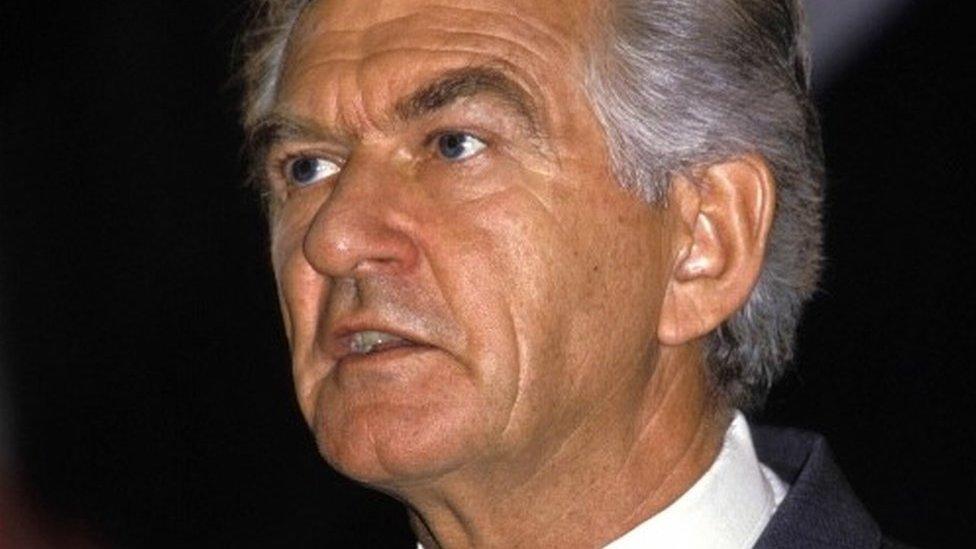
- Published13 May 2019
